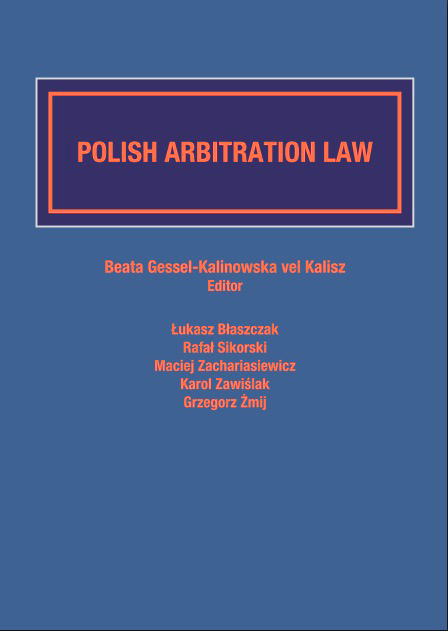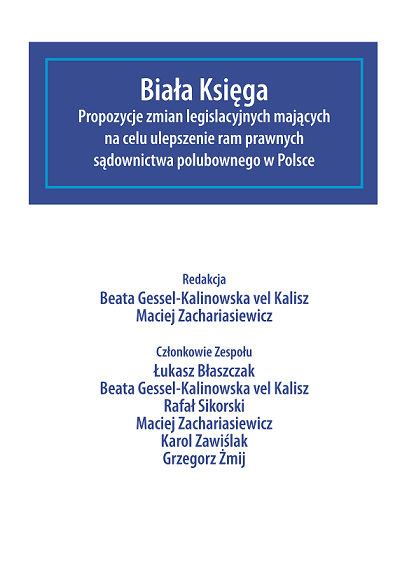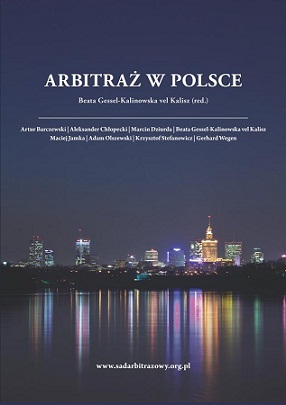The challenges and the future of commercial and investment arbitration
The book has been published only in English.
The book can be purchased at the Court of Arbitration Lewiatan.

„The Liber Amicorum which we now present to you is a tribute to Professor Jerzy Rajski honouring his 50th year of arbitration work.
Professor Rajski has served as an arbitrator in dozens of arbitrations, international and domestic, commercial and investment, in Poland and abroad, conducted in Polish as well as in English, French, and Spanish. He has had a unique opportunity to observe how arbitration has evolved through all these years and to appreciate the sheer scale of these changes – in two dimensions. On the one hand, he witnessed first-hand the epochal shift taking place in Poland and in other member countries of the Warsaw Pact, where commercial arbitration set out on an entirely new path in 1989. On the other, he had an active role in the organic evolution of arbitration in the West. This rich experience, combined with his extensive expertise in comparative private law, has led him to pose important questions concerning the nature, utility, and significance of arbitration now and in the future.
Fifteen years ago, Professor Rajski concluded that the nature of international disputes is incompatible with the state court system for dispute resolution because of its intrastate character. In Poland, there was an additional problem of the lengthy proceedings. For these reasons, Professor Rajski looked to international arbitration as the answer to the needs of the business community. Apart from its advantages – such as confidentiality, enforcement of awards on an international scale, professionalism of arbitrators, or timing – he described international arbitration as a system of justice which, due to harmonisation processes, was becoming ever more coherent and unified. Such unification is the result of international treaties as well as of soft law production.
Being as it is a good response to the needs of business, arbitration is expanding to new areas of disputes, such as corporate or intellectual property. Proper transformation of international arbitration into a competitive system of justice has been the biggest challenge of contemporary international arbitration. On the other hand, Professor Rajski did not identifythis system with any kind of business structure – he always emphasized the distinct values and ethos of arbitration and of its practitioners. ‘Arbitration is justice. Justice is not a business’, as he reminded us at the Forum of New Ideas in 2011. In one of our discussions, Professor Rajski concluded that, considering the growing judicialisation of arbitration (visible in, among other factors, increasing resort to tools familiar from classic litigation), the main difference between those two systems – that between ius and lex, where arbitration is a manifestation of ius, and litigation of lex – ought to be cultivated and preserved.
These ideas of Professor Rajski were the true inspiration for this book. We have extrapolated upon many of the strands included in Professor Rajski’s own publications and lectures, discussing issues such as globalisation, harmonisation, judicialisation, or professionalisation in the context of arbitration and its institutions. We also discuss what we consider to be a new strand – what is known as glocalisation. Professor Rajski himself has noted that, despite of its continuing transformation into a coherent system, it might be that arbitration does not fully respond to the needs of business, resulting in the growth of other alternative dispute resolution methods, such as mediation. This topic has been elaborated upon in these pages by J. Jemielniak, who clearly sees the development of ADR as a counteroffer to globalised arbitration. S. Breloulakis questions the feasibility of a transnational definition of the public policy concept, opting instead for a national doctrine which should ncompass a set of rules the primary purpose of which is to give effect to state public interest. These points contribute to the broader debate on globalisation versus glocalisation of arbitration.
This book is divided into eight areas, based on the subject matter to which the given chapter refers. We do admit that such classification may seem a bit contrived at times, seeing as numerous chapters have more of a cross-disciplinary character, with specific topics taken as a spring-board for wider deliberations. This book is of particular significance also for its publisher. Professor Rajski has served as a member of the Honorary Advisory Committee and has actively supported what was then a fledgling arbitration institution which has since developed into the Lewiatan Court of Arbitration.”
Beata Gessel-Kalinowska vel Kalisz
1. Akinci Karen
2. Almoguera Jesus
3. Asłanowicz Marcin
4. Bělohlávek Alexander J
5. Bernatonis Vilius
6. Blanke Gordon
7. Błaszczak Łukasz
8. Brekoulakis Stavros
9. Burger Laurence
10. Charlton Anthony
11. Dziurda Marcin
12. Elsing Siegfried
13. Ereciński Tadeusz
14. Frąckowiak Józef
15. Gessel Beata
16. Hauser-Morel Maria
17. Jemielniak Joanna
18. Jeżewski Marek
19. Kaćevska Inga
20. Kimberly Sarah
21. Kocur Michał
22. Kos Rafał
23. Machnikowski Piotr
24. Melis Werner
25. Meulemeester Dirk
26. Michałowska Katarzyna
27. Morek Rafał
28. Mourre Alexis
29. Nazarova Irina
30. Nowaczyk Piotr
31. Pazdan Jawiga
32. Pazdan Maksymilian
33. Philippe Mireze
34. Pukszto Anna
35. Rana Rashda
36. Rewald Roman
37. Sadowski Wojciech
38. Sołtysiński Stanisław
39. Stefanowicz Krzysztof
40. Varga Istvan
41. Wardyński Tomasz
42. Wegen Gerhard
43. Weitz Karol
44. Welser Irene
45. Wilske Stephan
46. Zielińska Alicja
Honorary Committee:
Gary Born
Prof. Bernardo M. Cremades
Prof. Ives Fortier
Prof. Julian DM Lew
Dr. Werner Melis
Prof. Stanislaw Sołtysiński
Organizing Committee:
Dr Beata Gessel-Kalinowska aka Kalisz
Bartosz Krużewski
Dr Katarzyna Michałowska
The book can be purchased at the Lewiatan Court of Arbitration.
Price: EUR 90
To purchase the book, please contact us at: sadarbitrazowy@konfederacjalewiatan.pl
Transfer details in EUR:
PEKAO S.A. III o/Warsaw
Konfederacja LEWIATAN
IBAN: PL07 1240 1040 1978 0010 4940 5065
SWIFT: PKOPPLPW
Data for transfer in PLN:
Konfederacja LEWIATAN
PEKAO SA III o/Warszawa
Account number: 69 1240 1040 1111 0000 0136 1232
Amount: The equivalent of EUR 90 converted into PLN according to the average exchange rate announced by the National Bank of Poland on preceding the day of payment
We cordially encourage you to buy the book!




 In the second stage, de lege ferenda remarks reported in the “Polish arbitration law” was the main subject of the Conference about Polish arbitration law held at the Royal Castle in Warsaw on 18 September, 2014. In parallel, all these issues have been presented to a wide audience in the form of a survey published on the website of the Lewiatan Court of Arbitration and arranged among the participants of the Conference.
In the second stage, de lege ferenda remarks reported in the “Polish arbitration law” was the main subject of the Conference about Polish arbitration law held at the Royal Castle in Warsaw on 18 September, 2014. In parallel, all these issues have been presented to a wide audience in the form of a survey published on the website of the Lewiatan Court of Arbitration and arranged among the participants of the Conference.